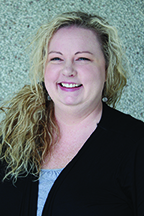Tria Skirko
 Office: Omak Library Room 306B, Omak Campus
Office: Omak Library Room 306B, Omak Campus
Phone: 509-422-7832
Email: tskirko@wvc.edu
B.A., Humanities, Western Washington University
Residency Teaching Certificate, Heritage University
MLIS, Library and Information Science, University of Washington
Tria Skirko has been the electronic services librarian for the WVC district since 2010.
From the WVC Discover magazine, summer 2016:
The Research Project. Many students encounter them, in face-to-face classes or online, from subjects such as automotive technology to English to the sciences. The Research Project may inspire curiosity, dread, or excitement, depending on the student. Many will wonder: where do I begin?
The WVC Libraries offer research databases for students on the Wenatchee and Omak campuses, and online. to be searchable, accessible, and updated, and they include thousands of newspaper articles, trade articles, scholarly journals, audio and electronic books, book reviews, art, films, reference material and technical information (such as manuals for automotive technology or engineering).
Tria Skirko helps students learn how to browse the stacks—the virtual kind. Tria is the district e-resources librarian. She provides classroom presentations to students to demonstrate how to use library databases, and she’s available in person, by phone, and via email to help students who have questions.
The databases “make a student’s life easier,” Tria said. “They’re designed for academics…. Results from the Internet in general aren’t necessarily useful for academic assignments.” The databases have citation tools, linking and emailing tools, and options for saving or downloading. While internet browsers will help students get started on research projects, with the library databases, students will “spend less time evaluating and more time understanding” their material, Tria said.
“Using a popular source vs. an academic source will lead to new discoveries in their research and will show them what scholars in their field are talking about vs. what people are thinking or reacting to,” she explained. “If you want to know about the academic conversations in a field, you have to look at the scholars.”
She encourages students to take their assignment to their librarian and ask which databases they should use or where they should look for information. “What we’re doing is we’re hanging out, waiting for them [students] to ask us for help. That’s what learning support is,” she said.
Tria is familiar with the WVC Libraries not only as a college faculty member but also as a former WVC at Omak Running Start student. She knew she wanted to work in academics. While working on her Washington State teaching certificate at Heritage University, Tria discovered the University of Washington Master in Library Science website. She applied for and was accepted into the program. Serendipity struck again—a staff member from the WVC at Omak library was retiring, so Tria applied for and was offered that position.
“I’m just attracted to the atmosphere of learning,” she said. “I like watching people make discoveries. I wanted to be a part of that world.”


